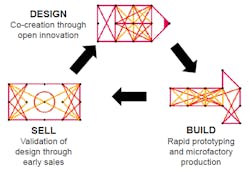At the May 2016 IndustryWeek Manufacturing and Technology Conference and Expo, Natarajan (Venkat) Venkatakrishnan—CEO of Firstbuild of Louisville, Ky.—described how his new product development business became self-funding in significantly under one year.
Admittedly, Firstbuild is a wholly-owned subsidiary of General Electric Co. (IW500/6), but GE did not provide financial support after the first few short months. The company was given the charter of developing new products and becoming fully self-funded in year-one. Either it would find a way, or not. Learning from Local Motors, an open source hardware developer, it did.
GE figures this is one way to foster entrepreneurial culture in a large company—to embed the startup mentality—without the never-ending battle to change the culture of the entire corporation.
Firstbuild's assignment was confined to appliances and required that it not simply make incremental improvements to existing products. Instead they had to create entirely new means of fulfilling a market want.
Venkat’s telling of the Firstbuild story included these three attributes of success:
- Leverage open innovation and partnerships
Open innovation and partnerships outside the Firstbuild four walls is instrumental in developing innovative ideas quickly. Firstbuild is charged with identifying and leveraging the community of innovators, enthusiasts, early adopters and visionaries -- people who want the newest things and who have identified challenges to be addressed. Firstbuild then must be ready to offer technical solutions to those challenges.
Nothing closed-minded about this product development effort. - Validate the product
Every product has to be validated by the market. The internet is a wonderful thing for testing interest, and verifying potential customers' willingness to put down money for something not yet available. If a product receives enough purchase decisions, Firstbuild begins rapid prototyping and low-volume, "microfactory" production. If not, either development work continues or a decision to abandon the idea for a different one is made.
Yes, GE does stand behind Firstbuild's products for service and support. That makes a big difference in getting people to pay $10,000 for a pizza oven that doesn’t need venting to cook a reportedly delicious pizza in 5 minutes—and that doesn’t yet exist. Or putting down money for the ability to self-roast coffee beans to your own taste. Or for any of hundreds of other product ideas tested.
The market for these new ideas is the cutting edge, not the late adopter. You and I may get interested after several of our friends are raving, but not before. We are not who Firstbuild is interested in.
When a product becomes mainstream, it is no longer a Firstbuild concern; it has been passed along to GE for production volumes and commercialization. - Speed is of the essence
Everything is fast. Idea generation, technology verification, market validation. All within weeks, not months or years. If your paycheck depends on it, move both quickly and wisely.
When a product idea doesn’t make it to minimum production, money is returned to the disappointed buyer. That means successes must far outweigh failures, and speed is of the essence. The company introduces an average of one new product per month, born from hundreds of ideas that are tested.
The reality is that every paycheck in a manufacturing company depends on the success of the service and product development team. Clunkers and missed market windows must be avoided by a new product development process that develops and delivers profitable products the market is willing to buy.
As product lifecycles shrink, so must product development time-to-market. Hit rates must increase and target costs must be quickly reached. Firstbuild is modeling one way to make that happen.
About the Author

Becky Morgan
President
Manufacturing businesses ranging from $100 million to $1 billion in annual sales value the advice of operations strategist Becky Morgan and her Finish Strong thinking.
With more than 25 years consulting with manufacturers, preceded by 14 years of hands-on executive responsibilities, Morgan has contributed to the success of aerospace, food, machining, assembly, electronics, tool and die, jewelry, and process industry businesses. And more.
Morgan speaks with audiences typically ranging from 35-150 attendees.

